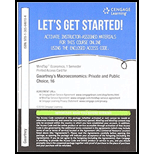
Reason for the great recession of 2008-2009.
Explanation of Solution
The recession of 2001 induces the Fed to adopt highly expansionary
Want to see more full solutions like this?
Chapter ST5 Solutions
MindTap Economics, 1 term (6 months) Printed Access Card for Gwartney/Stroup/Sobel/Macpherson's Macroeconomics: Private and Public Choice, 16th (MindTap Course List)
- Not use aiarrow_forwardProblem 3 Stata Output Analysis Suppose a study investigates the causal effect of education on wages. Table 1 reports the results of an OLS regression of wages (wage per hour in dollars) on education (years in education). Table 1 Source SS df MS Number of obs = 3,017 F(1, 3015) = 298.39 Model Residual 18904467 191011981 1 18904467 3,015 63353.8909 Prob > F 0.0000 R-squared 0.0901 Adj R-squared 0.0898 Total 209916448 3,016 69600.9444 Root MSE 251.7 wage Coef. Std. Err. t P>|t| [95% Conf. Interval] education cons 29.56644 183.9342 1.711605 23.15976 17.27 0.000 7.94 0.000 26.21041 138.5237 32.92247 229.3447 a. How would you write this relationship using the Core Model? (5 points) b. What is the value for B₁, the coefficient on Education? (2 points) C. What is the standard error of ẞ₁? (2 points) d. What is the R squared for the model? (2 points) e. What is the t statistic for ₁at the 5% level of significance? (2 points) Λ f. What is the 95% confidence interval for B₁? (2 points) Λ g.…arrow_forwardProblem 2 Hypothesis Testing Suppose you are interested in the effect of neighborhood crime incidents on high school graduation rates. You run the following regression model: Graduation; ßo+ß₁Crime; +ɛ¿ = You would like to test whether the neighborhood crime incidents have a statistically significant effect on high school graduation rate at the 5% level of significance (α = 0.05). You estimate the model and find that B₁ = -0.04 and se (B₁) = 0.008. a. Write down the null hypothesis and alternative hypothesis. (4 points) b. Calculate thet statistic of B₁. (5 points) C. What is the critical value of thet statistic for the 5% level of significance? (2 points) d. Calculate the 95% confidence interval for the coefficient on Crime? (6 points) e. Based on your answers to the questions b, c, and d, do you reject or fail to reject the null hypothesis you defined in question a? Justify your answer. (5 points) Λ f. Isẞ₁ statistically significant at the 5% level? (3 points)arrow_forward
- Problem 1 Endogeneity & Bias The ACT (an abbreviation of American College Testing) is a standardized test used for college admissions in the United States. Suppose you are interested in whether ACT preparation improves ACT scores. Consider the following model: ACT=B+B Preparation,+e; where Preparation measures the number of hours spent on ACT preparation and ACT is ACT scores. Each student is denoted by the subscript i. Suppose you estimate = - 21 andß₁ = 0.9. a. What is the dependent variable? What is the independent variable? (3 points) b. How do you interpret ẞ = 21 in this context? (4 points) 0 C. How do you interpretß₁ = 0.9 in this context? (4 points) 1 d. Describe a scenario which can cause the independent variable to be endogenous. (4 points)arrow_forwardHow does mining raw materials fir tech companies like apple affect the humar right violation all over the worldarrow_forwardConsider the market for electricity. Suppose that a power plant dumps byproducts into a nearby river, creating a negative externality for those living downstream from the plant. Producing additional electricity imposes a constant per-unit external cost of $490. The following graph shows the demand (private value) curve and the supply (private cost) curve for electricity. Use the purple points (diamond symbol) to plot the social cost curve when the external cost is $490 per unit. PRICE (Dollars per unit of electricity) 1400 1260 1120 980 840 700 560 420 280 140 ° D 1 2 3 D Supply (Private Cost) Demand (Private Value) 5 6 7 QUANTITY (Units of electricity) Social Cost The market equilibrium quantity is units of electricity, but the socially optimal quantity of electricity production is units. To create an incentive for the firm to produce the socially optimal quantity of electricity, the government could impose a unit of electricity. perarrow_forward
- How do mining of raw materials for a tech industry affects the human rights in the worldarrow_forwardAssume the Federal Interstate Commission began the fiscal year with the following account balances: FEDERAL INTERSTATE COMMISSION Trial BalanceOctober 1, 2020 Debits Credits Fund Balance with Treasury$810,000 Supplies 107,000 Equipment 1, 370,000 Accumulated Depreciation $484,000 Accounts Payable 130,000 Wages Payable 85,000Cumulative Results of Operations 1,588,000 $2,287,000 $2,287,000 Congress passed a spending bill providing $17,200, 000 to fund the agency's operations for the year. During the first quarter the commission processed the following items for payment (all items were paid by Treasury in the first quarter). Accounts payable$130,000 Wages payable 85,000 Salaries and benefits 507,000 Supplies 524,000 Contracted services 2,200,000 Grants 1,020,000 Equipment 620,000 Total$5,086,000 Unpaid wages at the end of the quarter totaled $37,000. In addition to the items paid in item 2, the commission received supplies of $24,000 and contracted services of $82,000 that are to be…arrow_forwardnot use aiarrow_forward
 Microeconomics: Private and Public Choice (MindTa...EconomicsISBN:9781305506893Author:James D. Gwartney, Richard L. Stroup, Russell S. Sobel, David A. MacphersonPublisher:Cengage Learning
Microeconomics: Private and Public Choice (MindTa...EconomicsISBN:9781305506893Author:James D. Gwartney, Richard L. Stroup, Russell S. Sobel, David A. MacphersonPublisher:Cengage Learning Macroeconomics: Private and Public Choice (MindTa...EconomicsISBN:9781305506756Author:James D. Gwartney, Richard L. Stroup, Russell S. Sobel, David A. MacphersonPublisher:Cengage Learning
Macroeconomics: Private and Public Choice (MindTa...EconomicsISBN:9781305506756Author:James D. Gwartney, Richard L. Stroup, Russell S. Sobel, David A. MacphersonPublisher:Cengage Learning Economics: Private and Public Choice (MindTap Cou...EconomicsISBN:9781305506725Author:James D. Gwartney, Richard L. Stroup, Russell S. Sobel, David A. MacphersonPublisher:Cengage Learning
Economics: Private and Public Choice (MindTap Cou...EconomicsISBN:9781305506725Author:James D. Gwartney, Richard L. Stroup, Russell S. Sobel, David A. MacphersonPublisher:Cengage Learning
 Economics Today and Tomorrow, Student EditionEconomicsISBN:9780078747663Author:McGraw-HillPublisher:Glencoe/McGraw-Hill School Pub Co
Economics Today and Tomorrow, Student EditionEconomicsISBN:9780078747663Author:McGraw-HillPublisher:Glencoe/McGraw-Hill School Pub Co





